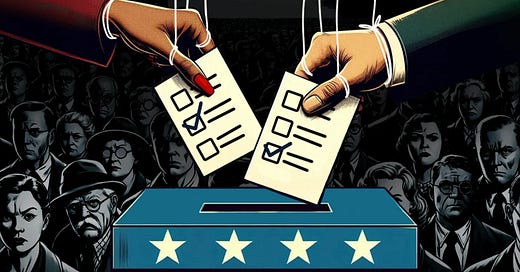We can be drawn to distrusting elections when "our side" loses
More polarization, more election distrust
I wrote a piece for Starts With Us that I think is on a very important topic: Trying to get people to see the importance of avoiding reaching for “it was rigged” views about elections when “their side” loses.
That piece is here: https://startswith.us/2024/10/02/more-polarization-more-election-distrust-avoid-temptations-to-call-lost-elections-rigged.
Please consider sharing it if you think it’s important. A few thoughts on the approach:
I think it’s important to try to speak to “both sides” at the same time. Including examples of unreasonable election distrust from both political groups helps people see how their own attraction to “it was rigged” views may be similar to what some of their political opponents do. And because we don’t want to be like “them,” that approach can be more persuasive than just lecturing someone on why “their side” is bad.
Some will object, “But the other side is worse; it’s wrong to compare these group behaviors” but I think this impulse to avoid comparisons and avoid examining fundamental human dynamics only amplifies our divides. When we fear being seen as insufficiently judgmental of “the bad guys,” we end up mainly spending our time writing critiques of the “other side,” which only speak to the choir and divide us more. To persuade people in a polarized environment, you have to give them something; you have to show them that you see their frustrations and that you can see these problems present for people in both groups (regardless of if you or others see the problems worse on one side).
The goal of this piece is only to get people to examine how emotions can make their views more pessimistic and unreasonable, which is something I hope that everyone, no matter their politics, can see. The goal of this piece is not to tell people “you are wrong for thinking a presidential election is illegitimate” because a) I can’t address all reasons people think such things, and b) attempting to do that too forcefully would work against persuading people of the main point and accomplishing that goal. Again, the goal is something I see as attainable: getting people to see how their views may be overly pessimistic and emotional, and if I’ve done that, I think that’s a big accomplishment.
I don’t think it’s the best piece it could be; I’ve already been thinking of ways to improve it. If you have thoughts on how it could be made more persuasive (to either a Democrat-leaning audience or a Republican-leaning audience), please let me know.




